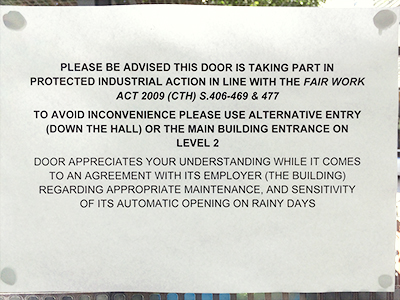Zombie economics
One of the most astute economics observers in the world today is John Quiggin, author of the outrageously honest book Zombie Economics: How dead ideas still walk among us, published by Princeton University Press. 
Professor Quiggin has become one of the rare economists still warning of the inherent behaviours and theories that the ‘financial industry’ adhered to – right up until they created the Global Financial Crisis (or, in US parlance, the Great Recession) – are hardly dead yet. In fact, they are rising from the grave again.
Here is a particularly apt piece of wisdom from that marvellous book – published in 2010 when the GFC was alive and well and zombie economics should have been put to rest. It examines all that elegant and perspicacious economic stability theory that completely missed the onset of the GFC – and in fact helped cause it – and so Zombie Economics should be required reading in all good schools of economics and, perhaps, politics:
“For many years economists have worked like the anecdotal drunk who searches for his dropped keys under a lamp post because the light is better there. In the future, and particularly in macroeconomics, economists will need to look where the keys are and build tools that will improve the chances of success.”
And this cracking analysis of the curious growth of the ‘financial industry’:
“The growth of the financial sector since the mid-1970s has been staggering. The financial services industry’s share of corporate profits in the United States rose from around 10 percent in the early 1980s to 40 percent in 2007, at a time when the profit share of national income was also growing strongly …
“Volumes of financial activity grew at rates that defy any simple interpretation. The Bank for International Settlements has estimated the global volume of outstanding derivative contracts at around $600 trillion, about ten times the world’s total output. In the normal course of events, most of these transactions net out to zero, but even a small miss-match can produce losses or gains of many billions …
“Along with all this, the income and wealth of those working in the financial sector grew massively, as did their numbers. The salaries of financial sector executives outstripped those prevailing in other industries , at a time when executive salaries in general rose to huge multiples of the incomes of ordinary workers …
“But the political power of the finance sector does not depend solely on command over economic resources. After the economic dislocation of the 1970s, the financial sector became, in perception and to some extent in reality, the most important guarantor of economic stability and prosperity. Governments sought desperately to gain and maintain the AAA ratings issued by agencies such as Moody’s and Standard & Poor’s. The alternative was the political disgrace of a downgrading and the ultimate threat of capital flight …”
The Bottomline? Prof. Quiggin says it elegantly:
“The Global Financial Crisis gives the economics profession the chance to bury the ideas that led the world into crisis, and to produce a more realistic, humble, and above all, socially useful body of thought.”
That was written in 2010. How are our most respected and quoted economists going? How are our politicians, who listen to them, going? Back to our pesky Bottomline: How are we going?
ends

 How to resolve AdBlock issue?
How to resolve AdBlock issue? 




